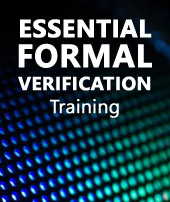How Formal Works
Formal algorithms • Counter-examples • Formal engines • Clocking • Initialization and reset sequences • Formal flow and synthesis • Debugging with formal
Formal Modeling
Formal synthesis • Safety • Liveness • Embedded assertions • Fairness • Formal testbenches • Helper code
Nondeterminism
Free variables • Design symmetry • Data independence • Symbolic constants • Formal testbenches • Formal scoreboarding
Abstractions and Reductions
Complexity in formal • Reduction and safe reduction techniques • The basic abstraction process • Types of abstract models • Design symmetry and data independence • Example of design abstractions • Safe abstractions
Abstract Modeling
Abstract checker models • Abstraction by induction • Abstraction using state machines • Abstraction using events • Data integrity checking • Abstract checker model examples
Constraining Formal
Underconstraining • Overconstraining • Guidelines • Advanced property writing • Constraint dependencies • Determining the minimal constraint set • Error Injection
More On Constraints
Writing constraints for performance • Large input stimulus generation • Constraint dependencies • Helper constraints • Packet-based protocols
Formal Equivalency
Differences between LEC and SEC • How SEC works • Assume-guarantee process • Automatic and user-defined mappings • Helper assertions and hints • Dealing with SEC inconclusives • Applications for SEC
Bug Hunting and Inconclusives
Formal regressions • Dealing with inconclusives • Modal analysis and case splitting • Helpers and assume-guarantee • Swarm verification and bug-hunting techniques • Bounded unreachability analysis • Bounded proof strategy • Using Abstraction
Formal Coverage and Sign-off
Formal approaches • Formal sign-off methodology • Formal planning • Formal verification process • Types of formal coverage • Interpreting coverage
Formal VIP
Verification IP development • VIP configuration • Developing flexible VIP • Open Verification Library (OVL) • VIP use cases • Encryption • VIP best practices
Appendix – Post-Silicon Debug
The post-silicon debug flow • Recreating real-world failures with formal • Capturing failing scenarios • Asserting failing scenarios • Debugging post-silicon failures




